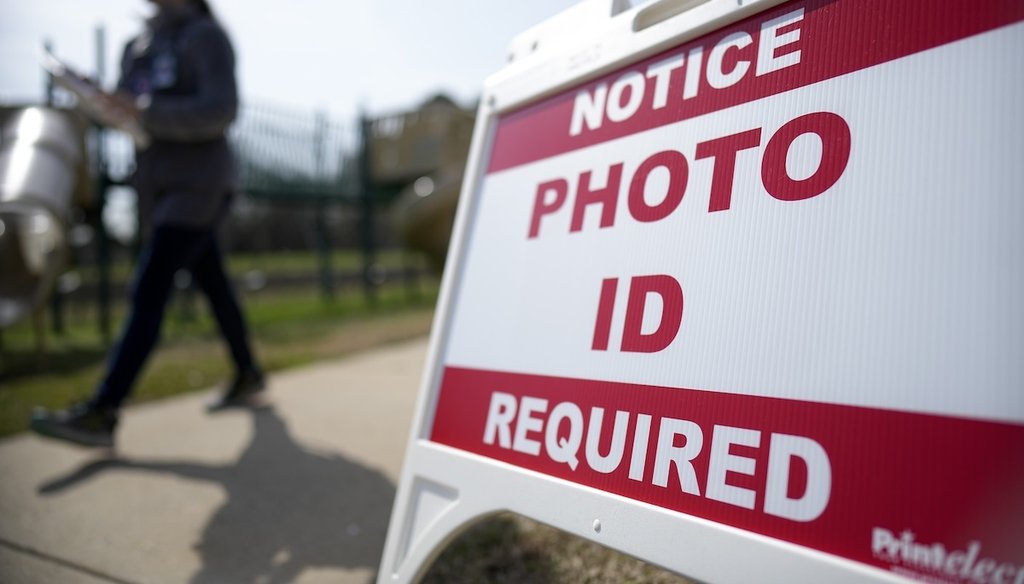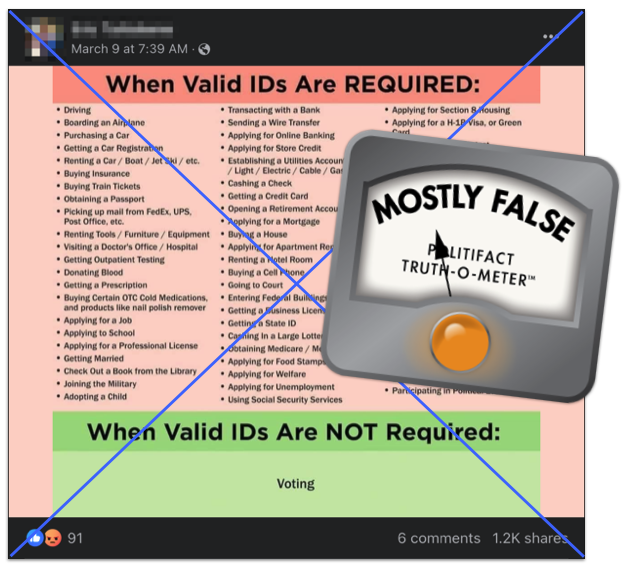Stand up for the facts!
Our only agenda is to publish the truth so you can be an informed participant in democracy.
We need your help.
I would like to contribute

A Super Tuesday voter walks past a sign requiring a photo ID at a polling location March 5, 2024, in Mount Holly, N.C. (AP)
No ID required to vote? That’s not the case for most voters
If Your Time is short
-
In 36 states, voters are required or requested to present some form of identification at the polls. Some state laws are stricter, requiring photo IDs; other states are laxer, accepting bank statements or utility bills as proof of identity.
-
Fourteen states and Washington, D.C., require no identification to vote at the polls. These states use other methods, such as signature matching, to verify voters’ identities.
-
Federal law requires first-time voters to show ID when requesting mail ballots. Some states have additional ID requirements for voters mailing in ballots.
-
Our mission: Help you be an informed participant in democracy. Learn more.
As the 2024 presidential election nears, some social media users are resurfacing the claim that proper identification is not required to vote in the United States.
A March 9 Facebook post shared a list of 65 activities that require "valid IDs," including driving a car, buying alcohol or cigarettes, boarding a plane and applying for a job.
The only thing that doesn’t require a valid ID, the post says, is "voting."
This post was flagged as part of Meta’s efforts to combat false news and misinformation on its News Feed. (Read more about our partnership with Meta, which owns Facebook and Instagram.)
(Screengrab from Facebook)
Sign up for PolitiFact texts
Former South Carolina Gov. Nikki Haley, a 2024 Republican presidential candidate until this month, in 2022 shared a similar claim that voter ID was not required; we rated that Mostly False.
Has much changed since then? Not really. Voter ID laws vary across the country, but in most states, voters must verify their identity in some way at the polls.
The National Conference of State Legislatures said 36 states have laws that require or request some form of identification to vote in person. Those laws applied to about 62% of registered voters in the 2022 election, according to U.S. Census Bureau data.
The laws in these 36 states vary as to whether they are strictly applied and whether a photo ID or another form of identification is accepted.
Ten states — Arkansas, Georgia, Indiana, Kansas, Mississippi, Missouri, North Carolina, Ohio, Tennessee and Wisconsin — have what the conference labels as "strict" photo ID laws. This means that voters who lack acceptable photo IDs must vote a provisional ballot and take additional steps to verify their identity after Election Day for their ballot to be counted.
Three states — Arizona, North Dakota and Wyoming — have "strict" ID laws, according to the conference, but photo ID is not the only identification accepted. In Arizona, for example, a recent utility bill or bank statement are acceptable forms of ID.
In 23 states, the voter ID laws are what the conference considers "nonstrict," meaning in most cases, voters without acceptable identification can cast a regular ballot without having to take further action after Election Day. For instance, a voter without proper identification may sign an affidavit or poll workers may vouch for a voter’s identity.
Eleven of these "nonstrict" states accept only photo IDs; the other 12 states accept photo IDs and other forms of identification.
The remaining 14 states and Washington, D.C., do not require any form of identification to vote at the polls, NCSL said. These states and Washington, D.C., which together accounted for about 38% of registered voters in 2022, use other methods to verify voters’ identities, such as matching voters’ signatures or asking voters for personal information.
Federal law requires first-time voters who register to vote by mail and didn’t provide proof of identification at the time of registration, to show a valid photo ID or another form of ID, such as a current paycheck, bank statement or government document that shows the voter’s name and address, the conference said.
States have different laws and procedures for verifying the identity of voters who cast mail ballots.
Featured Fact-check
In 22 states, voters applying for a mail ballot must show ID, provide an ID number, such as from a driver’s license or Social Security card, or obtain a witness or notary signature, according to the Voting Rights Lab, an organization that tracks state election laws and proposed legislation.
In 21 other states, the Voting Rights Lab said, voters requesting mail ballots must verify their identity using personal information, such as date of birth, address or signature.
The remaining seven states and Washington, D.C., have universal mail voting, so ballots are automatically sent to voters ahead of every election, without voters needing to request them, the Voting Rights Lab said.
Election officials in every state use signature verification to validate the identities of voters who cast mail ballots, the National Vote at Home Institute said.
After the 2020 election, many Republican lawmakers sympathetic to former President Donald Trump’s false claims of voter fraud have pushed for tighter voter ID requirements to combat fraud, which national experts have said is isolated and rare. Democrats and voting rights advocates have criticized some state voter ID laws, particularly ones with narrow lists of acceptable types of ID, as overly burdensome.
Our ruling
A Facebook post claimed that valid IDs are not required to vote in U.S. elections.
But there isn’t a total absence of voter ID laws in the U.S. In 36 states, voters are required or requested to present some form of ID to cast a ballot in person. These laws applied to about 6 in 10 voters in the 2022 elections. The remaining 14 states and Washington, D.C., use other methods to verify voters’ identities.
Federal law requires first-time voters to present valid ID when requesting mail ballots, and almost half the states have additional ID requirements for voters applying for mail ballots.
We rate this claim Mostly False.
Our Sources
Facebook post (archived), March 9, 2024
National Conference of State Legislatures, "Voter ID Laws," Feb. 2, 2024
National Conference of State Legislatures, "Summary: Voter Verification Without ID Documents," Feb. 28, 2024
U.S. Census Bureau, "Voting and Registration in the Election of November 2022 (Table 4c)," April 2023
Voting Rights Lab, "ID Requirements | State Voting Rights Tracker," accessed March 19, 2024
Voting Rights Lab, "Requesting Mail Ballots | State Voting Rights Tracker," accessed March 19, 2024
National Vote at Home Institute, "VAH Myths," accessed March 19, 2024
PolitiFact, "Rules vary, but 35 states require some form of ID to vote," June 13, 2022
PolitiFact, "As extremes shape voter ID debate, the rules keep getting stricter," Aug. 9, 2021
Browse the Truth-O-Meter
More by Sara Swann
No ID required to vote? That’s not the case for most voters
Support independent fact-checking.
Become a member!
In a world of wild talk and fake news, help us stand up for the facts.









































